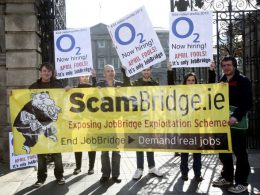By Drew Freyne
Intercom, a billion-dollar Irish tech company, faces employee unrest following its recent decision to end support for Pride celebrations and employee resource groups (ERG). ERGs are put in place to support minority or otherwise marginalised workers in large organisations.
The company claims these policies have been in place since last year, and are aimed at “deprioritising absolutely everything that does not directly contribute to our success”, according to a company spokesperson. But it has sparked anger among its workers, with Pride flags being removed during Pride month.
A divisive and political CEO
The chief executive, Eoghan McCabe has touted business expansion and competition from other firms using AI as the key reason for the “tough” decision to drop its open support for LGBTQ+ rights. This is despite evidence showing that inclusivity practices are good for businesses, which is presumably why the company in 2019 boasted about donating €10,000 to BelongTo, and in Dublin hosted “a breakfast for our LGBTI+ employees, allies, friends and family to set them up for the day before the march begins”, while, “In San Francisco we’re having an outdoor picnic, in Chicago we’re having a rooftop BBQ, and in London we’re doing LGBTI+ screenings.”
McCabe also justified his decision by alleging that Pride has become connected with “divisive” and “political” issues, disregarding the fact LGBTQ rights are inherently political – Pride is, after all, a protest commemorating a riot in New York in 1969. And only bigots and the far right see LGBTQ+ rights as divisive.
But given McCabe’s own penchant for liking and retweeting right-wing culture war veterans such as Tucker Carlson, or taking selfies with conspiracy theorists such as Robert F. Kennedy Jr, it seems reasonable to think that this decision has less to do with this being “a crazy time for tech” and the need for “very high degrees of focus” (rainbow flags are too distracting for some it seems!), and more to do with his own reactionary politics.
Corporate cowing to the backlash
This decision by McCabe and Intercom is a disgrace and an insult to Intercom workers, and the whole LGBTQ+ community. Moreover, it has to be seen in the context of an international backlash against progressive movements and the rights of trans people in particular. That’s the difference with 2019 – four years after the Marriage Equality referendum and one year after the repeal referendum in Ireland – when not only was it safer for corporations to promote LGBTQ+ rights, but essential for business.
But that support was always more cynical than serious, and we see now how quickly corporations can abandon it as soon as right-wing forces begin to whip up even the faintest opposition to LGBTQ+ rights successfully. Target and Starbucks in the US are other notable examples of this. Workers need to organise to resist every incidence of a pulling back from LGBTQ+-friendly policies and culture in the workplace – as many newly unionised Starbucks workers are doing right now across the US via strike action.
It is an important lesson for the struggle for LGBTQ+ rights that we cannot rely on corporate allies and certainly not their twisted CEOs in the fight for our rights. They, and their capitalist system that cultivates division and oppression, are enemies not allies in the struggle for real liberation.












